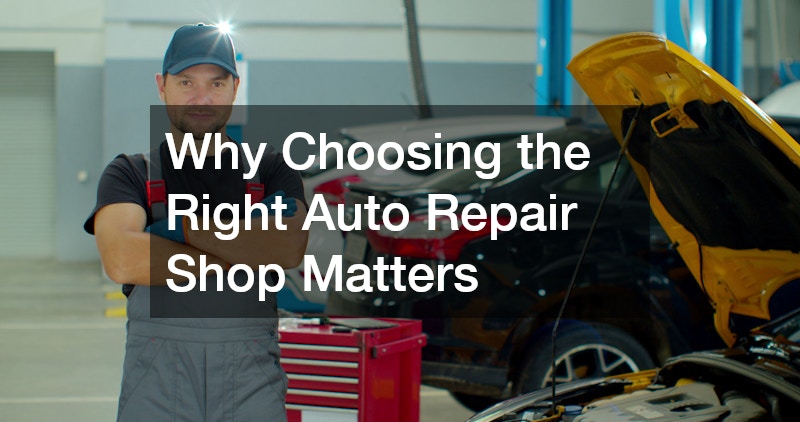Why Choosing the Right Auto Repair Shop Matters

I. Why Choosing the Right Auto Repair Shop Matters
Choosing the right car repair shop is one of the most important decisions a vehicle owner can make. It’s not just about convenience or finding the lowest price — it’s about entrusting your vehicle to someone who knows what they’re doing. A recommendation for a car repair shop with experience can save you from costly mistakes, repeated repairs, and safety risks. Experienced mechanics not only fix problems correctly the first time but also provide guidance to prevent future issues, giving you confidence in your car’s reliability.
Many car owners make the mistake of selecting a shop based solely on location or a quick online search. While these factors matter, they don’t guarantee expertise. This guide will show you how to evaluate a car repair shop’s experience, credentials, reputation, and services, helping you make an informed decision before committing.
II. Why Experience Matters in Auto Repair
Experience in auto repair goes beyond just the number of years a shop has been in business. It encompasses the skills, certifications, problem-solving abilities, and knowledge accumulated over time. Here’s why it matters:
-
Accurate Diagnostics: Experienced mechanics can quickly identify the root cause of a problem. Inexperienced shops may misdiagnose issues, leading to unnecessary repairs and higher costs.
-
Safety: Faulty repairs can compromise vehicle safety. A skilled mechanic ensures that every repair meets safety standards.
-
Cost Savings: An experienced shop may cost slightly more upfront but can save you money in the long run by performing repairs correctly the first time.
-
Access to Quality Parts: Veteran shops often have connections to reliable parts suppliers and know which components will last.
-
Trust and Peace of Mind: Knowing your car is in capable hands reduces stress and uncertainty, making routine maintenance and emergency repairs less daunting.
Real-world examples show the importance of experience. Consider a hybrid car with an intermittent electrical issue. An inexperienced shop may replace multiple components before finding the actual problem. An experienced shop, familiar with hybrid systems, can diagnose and repair the issue efficiently, saving the owner time, money, and frustration.
III. Credentials and Certifications to Look For
When evaluating a car repair shop, credentials are a critical indicator of expertise. While experience is valuable, certifications validate that the mechanics have been formally trained and tested.
-
ASE Certification (Automotive Service Excellence):
ASE-certified mechanics have passed rigorous tests and demonstrated proficiency in specific areas like brakes, engine repair, and electrical systems. Look for shops that display ASE certificates in the waiting area or on their website. -
Manufacturer Training Programs:
Certain manufacturers offer specialized training for mechanics. For example, a Toyota-certified shop has mechanics trained specifically on Toyota vehicles. This specialized knowledge ensures precise repairs and the use of approved procedures. -
State Licensing and Inspections:
Many states require repair shops to hold licenses or pass periodic inspections. Check your state’s requirements and confirm that the shop is compliant. -
Verification Online:
Most certifications and licenses can be verified online. Don’t hesitate to ask the shop directly and cross-check their claims. -
Red Flags:
Be cautious of vague claims like “We have the best mechanics” without proof or visible certifications. Experience backed by credentials is far more reliable.
IV. Reputation: Reviews, Testimonials, and Word of Mouth
A shop’s reputation often speaks louder than any certification. Reviews and testimonials provide insights into real customer experiences and can reveal the level of expertise.
-
Online Reviews:
Check platforms like Google, Yelp, and the Better Business Bureau. Look for patterns rather than individual reviews. Multiple complaints about misdiagnosis or repeated visits may indicate inexperience. -
Reading Reviews Critically:
Look for reviews that provide details, such as the type of repair performed, communication quality, and overall satisfaction. Short, vague reviews like “Great service!” offer little insight. -
Local Recommendations:
Asking neighbors, coworkers, or local community groups can help you discover trusted shops. Personal recommendations often come from long-term experiences with the same shop. -
Case Study:
A Burlington, VT shop, for instance, gained recognition after years of consistently handling European car repairs. Customers praised their ability to diagnose complex issues quickly, which built the shop’s reputation as an expert in its niche. -
Social Media Mentions:
Checking a shop’s social media profiles can reveal interactions with clients and how they handle complaints, providing further insight into experience and professionalism.
V. Years in Business vs. Type of Experience
While longevity is a good indicator of reliability, it’s not the sole measure of experience.
-
Longevity:
Shops that have operated for a decade or more usually demonstrate consistent quality and customer retention. They have weathered market changes and know the industry inside out. -
Specialization:
Experience in a general repair shop differs from specialized expertise. For example, transmission, hybrid, or European car repairs require additional training and practice. -
Questions to Ask:
-
How long has your shop specialized in my vehicle type?
-
Can you provide examples of complex repairs you’ve handled?
-
How often do your mechanics undergo specialized training?
-
-
Insight:
A new shop can be excellent if staffed by highly trained mechanics, but proven experience in a specific vehicle type or repair category is invaluable.
VI. Shop Facilities and Technology
Modern facilities often reflect a shop’s commitment to quality and staying current with automotive technology.
-
Diagnostic Tools:
Advanced diagnostic equipment is essential, especially for newer cars with computerized systems. Shops using outdated tools may miss critical issues. -
Cleanliness and Organization:
A tidy, well-organized shop indicates professionalism and attention to detail. Cluttered or chaotic environments may reflect sloppy work habits. -
Parts Used:
Experienced shops typically source quality parts, including OEM (Original Equipment Manufacturer) components when needed. -
Hybrid and EV Readiness:
Shops experienced with electric vehicles and hybrids demonstrate advanced expertise and adaptability.
VII. Mechanic Training and Ongoing Education
Automotive technology evolves rapidly. Experienced shops invest in continuous education for their mechanics.
-
Importance of Continuing Education:
New car models, hybrid systems, and electronic components require ongoing learning. Mechanics who stay updated can handle modern cars more effectively. -
Certifications and Workshops:
Regular participation in workshops, manufacturer training, and ASE re-certification is a sign of a shop that values knowledge. -
Questions to Ask:
-
What recent training have your mechanics completed?
-
Do you attend workshops on the latest vehicle technologies?
-
-
Warning Signs:
Shops relying solely on old experience without continuing education may not handle newer models efficiently.
VIII. Customer Service as a Reflection of Experience
Experience isn’t just about technical skills — it’s also reflected in how a shop treats customers.
-
Transparency:
An experienced shop explains repairs in clear terms, providing detailed estimates and answering questions patiently. -
Written Estimates and Documentation:
Professional shops provide written estimates and keep records of past repairs. This transparency protects both the customer and the shop. -
Handling Complaints:
Experienced shops have established processes for addressing disputes or warranty claims, reflecting confidence in their work. -
Case Example:
A shop experienced with recalls manages paperwork and repairs seamlessly, reducing customer stress and avoiding repeat visits.
IX. Warranty, Insurance, and Guarantees
A strong warranty or guarantee is a hallmark of an experienced repair shop.
-
Types of Warranties:
-
Labor warranty: Covers repairs done by the shop.
-
Parts warranty: Ensures components used are reliable.
-
Nationwide coverage: Some shops offer warranties that apply across states.
-
-
Liability Insurance:
Experienced shops carry insurance to protect customers in case of accidents or damages during service. -
Red Flags:
Shops that refuse to provide warranties or guarantees may lack confidence in their work.
X. Questions to Ask Before You Commit
Here’s a practical checklist for evaluating a car repair shop:
-
Are your mechanics ASE-certified?
-
How long have you specialized in my vehicle make/model?
-
Can you provide a written estimate before repairs?
-
What warranties or guarantees do you offer?
-
Can you show examples of similar repairs you’ve completed?
-
How do you source your parts?
-
How do you stay updated with the latest vehicle technologies?
Consider creating a printable checklist for future reference.
XI. Comparing Shops and Making the Final Decision
-
Visit Multiple Shops:
Compare professionalism, transparency, pricing, and equipment. Don’t rush the decision. -
Weighing Experience vs. Cost:
Sometimes a slightly higher price at a more experienced shop saves money in the long run. -
Trust Your Instincts:
Comfort and confidence in the shop matter. If you feel uneasy or rushed, it may be worth exploring other options.
XII. Common Red Flags of Inexperienced or Untrustworthy Shops
-
Refusal to provide written estimates.
-
High-pressure upselling without justification.
-
Lack of certifications or evasive answers.
-
Disorganized shop environment.
-
“Too good to be true” pricing that seems unusually low.
Being aware of these signs helps you avoid costly mistakes.
XIII. Building a Long-Term Relationship with a Trusted Shop

Once you find a reliable, experienced shop, cultivating a long-term relationship has many benefits:
-
Priority scheduling for repairs and maintenance.
-
Discounts or loyalty programs.
-
Mechanics familiar with your vehicle’s history can diagnose issues faster.
-
Peace of mind knowing your car is consistently in capable hands.
Investing time to find the right shop now pays dividends over the lifespan of your vehicle.
XIV. Conclusion
Finding and trusting an experienced auto repair shop is essential for vehicle longevity, safety, and cost-efficiency. By checking credentials, reading reviews, assessing facilities, and asking the right questions, you can confidently select a shop that meets your needs.
Remember, a recommendation for a car repair shop with experience should not be taken lightly. Investing time upfront ensures that your vehicle receives high-quality service from skilled mechanics, giving you peace of mind for years to come.
For further guidance on choosing reputable shops, you can refer to:
